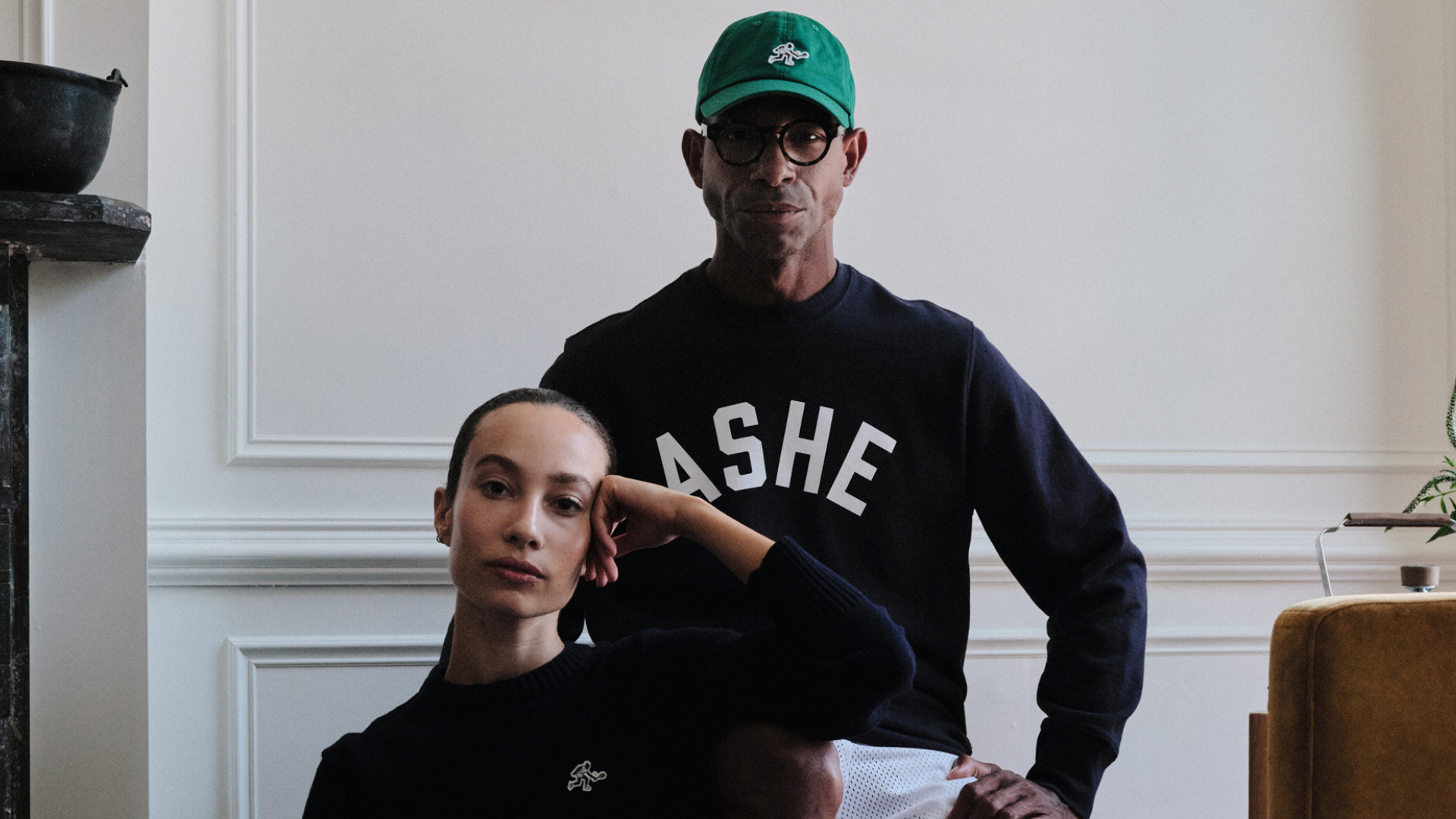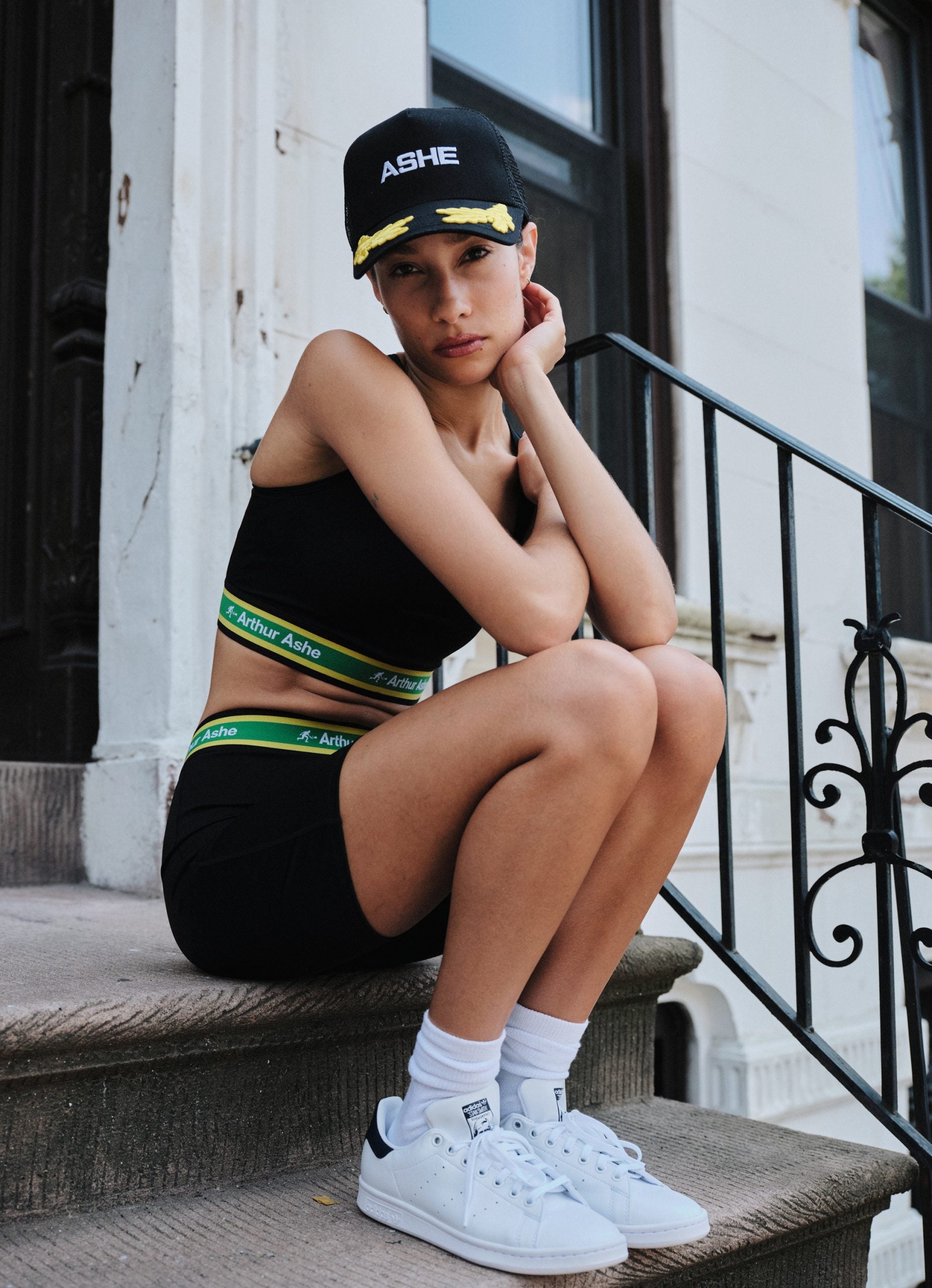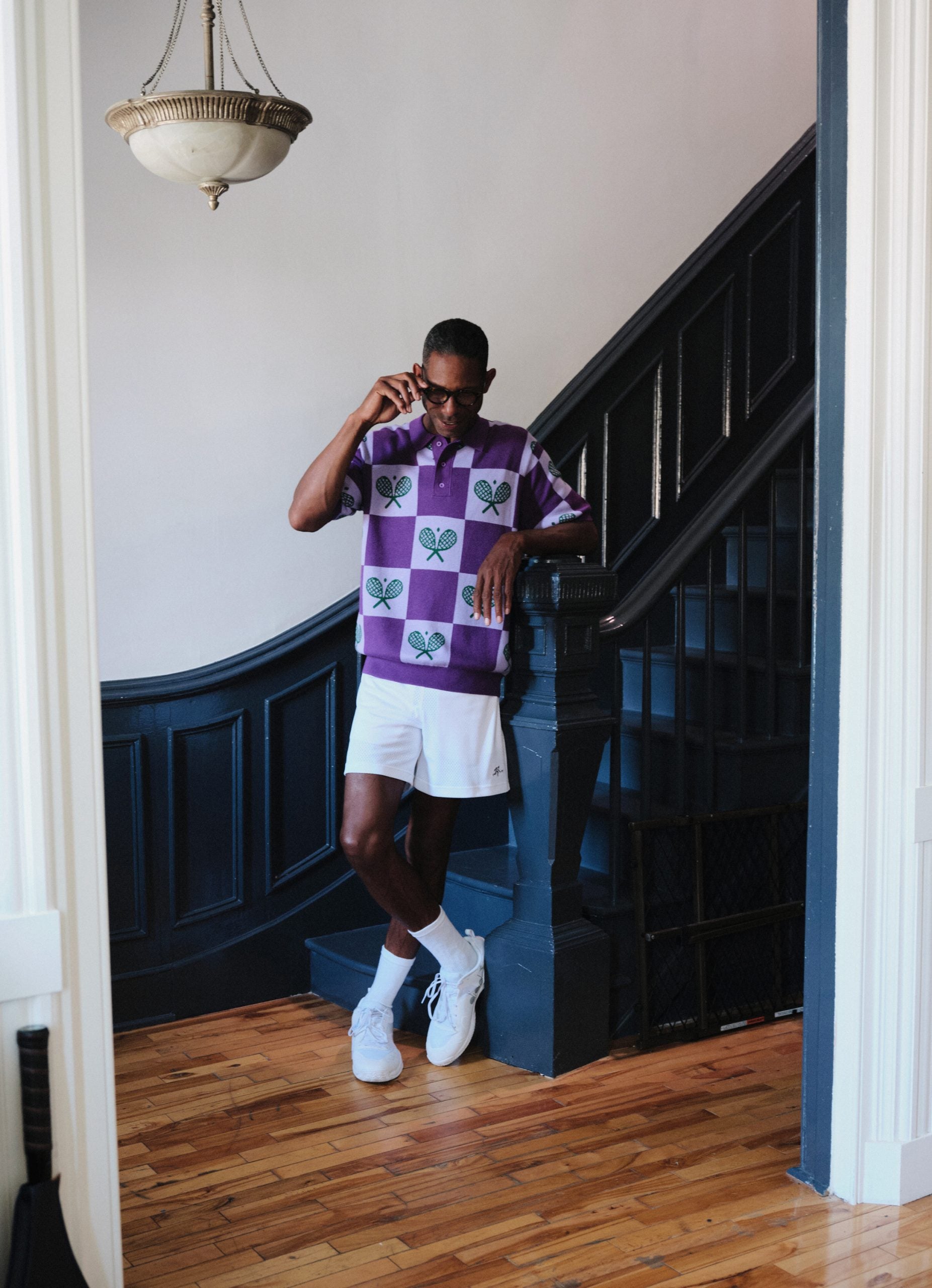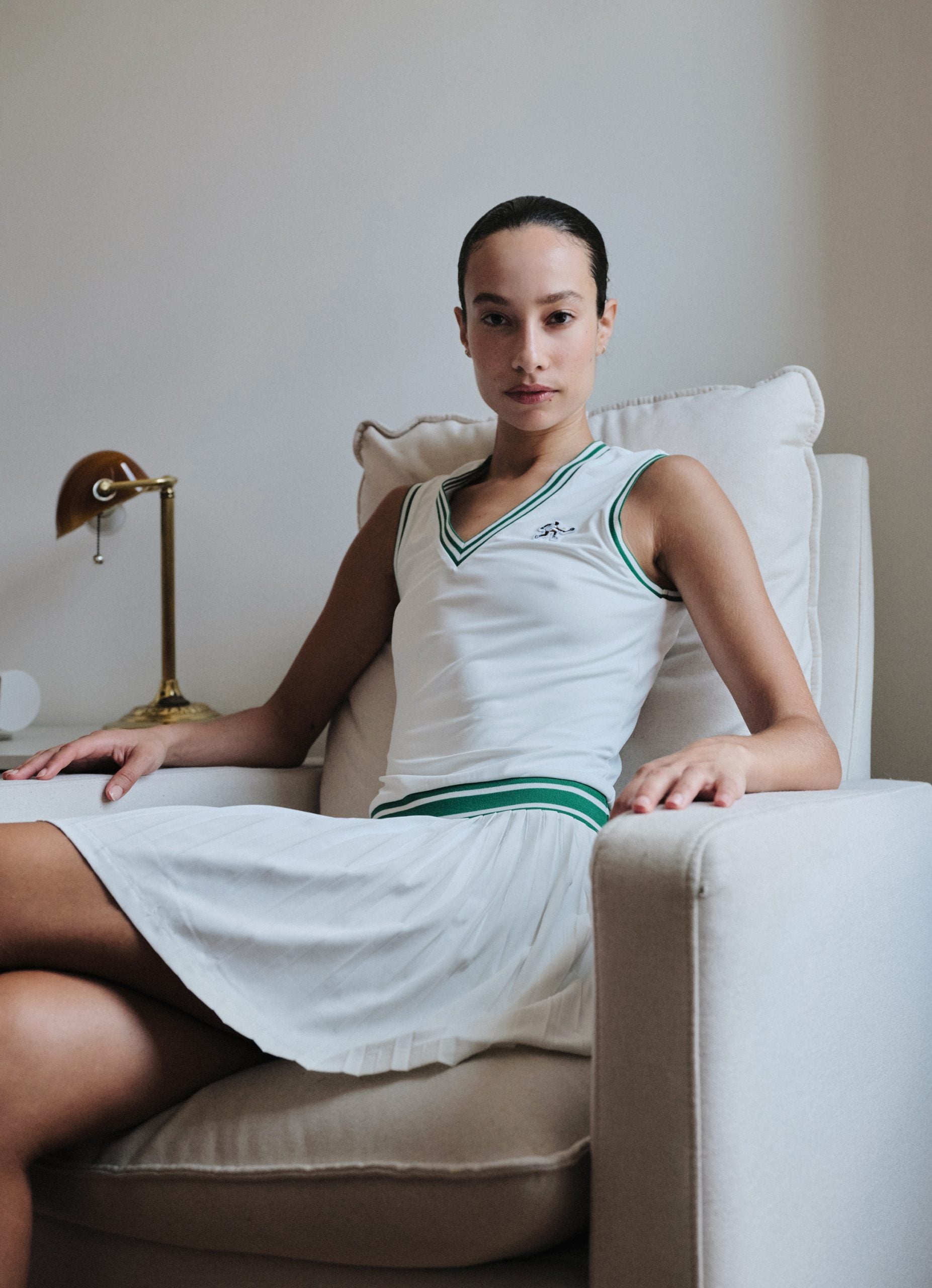
For six years, Rowing Blazers and its surrounding heritage brands have operated in the liminal space between preppy and streetwear, recontextualizing classic Americana aesthetics into something more timely. Founder and creative director, Jack Carlson asserts that the brand does not fit into one category. Instead, it applies the philosophies of independent, collaborative fashion to reframe preppy apparel in a self-aware way. Arthur Ashe, an eponymous lifestyle brand named after the ’60s and ’70s tennis legend, is following the same ethos with Carlson and art director Karl-Raphael Blanchard at its helm. Now in its second season, the label is amplifying the legacy of its namesake through its take on classic tenniswear, just in time for the U.S. Open.
In addition to being the only Black man to have won the singles titles at Wimbledon, the U.S. Open, and the Australian Open, Arthur Ashe was also an arbiter of the ‘70s Black Ivy style. With every victory, he ushered in a coolness to traditional tennis apparel, expanding notions of what one could wear while playing the sport. His on-court fitted polos, tailored shorts, and oversized shades are now source material for the brand, introducing a growing sporting audience to the modernized yet referential genre.
Country club spaces that decided predominately tennis attire, and would have once excluded Ashe from segregated courts, are the same site from which dominating images of American preppiness are now being reshaped. The grassy lawns and green, sunlit courts carry an escapist nostalgia that Arthur Ashe and Rowing Blazers use to backdrop a “club for everyone,” as Carlson describes. In recent years, there has been an online romanticization of American prep culture spanning movies, fashion, and recreational habits. Post-pandemic, racquet sports such as squash and badminton are on the upswing and so is the accompanying tennis-core aesthetic. This bodes well for Arthur Ashe, which emerges in a wave of accessible, inclusive American brands that are invested in their sartorial context.

As art director, Karl Blanchard thoroughly researched all the details behind Arthur Ashe’s development and marketing. This is a legacy brand, with a real person behind it, and it was important to the team to honor the depth behind the name. “Arthur Ashe is different in that it’s in a lane that is pulling from a past figure and is able to create something new,” Blanchard expresses. In 2022, he produced the first Arthur Ashe collection photoshoot from Forest Hills Stadium in Queens, the first home of the U.S. Open. The shoot remains one of his favorite projects to date, ranking in a series of choices to position the brand as bold yet classic.
Each season is an opportunity to innovate design-wise and implement more color and textural variety. While the initial launch in 2022 introduced several real-life-inspired pieces resembling outfits Arthur Ashe actually wore on the court, this second collection is more interpretative, demonstrating the creative bounds of a growing lifestyle brand. There are iconographic core pieces, like the Icon Sweater featuring an emblem of Ashe’s signature backhand stance, alongside bold, patterned ’70s-inspired polos. The goal of this range is to reflect Ashe’s personal evolution and interests.
Carlson and Blanchard are students of the early ’00s and late ’90s. Injected with ’90s design cues, Blanchard’s interpretation includes influences from skate culture and references to the history of streetwear. He is also fascinated with aspects of the clean-cut, tailored ’00s classic prep heyday, heavily influenced by Ralph Lauren, Tommy Hilfiger, and Nautica. Among the many reasons the duo works so well together are their personal takes on the foundational Americana aesthetic. The foundation remains, but elitist and stuffy, it is definitely not. Rowing Blazers builds upon an ironic interpretation of what prep style means today, nodding to the structural fashion influences, but incorporating a constantly growing milieu of inspiration.

The label is as much a posthumous celebration of Ashe’s commitment to service as it is an exercise in stylistic exploration. “We want to exemplify how beautiful of a person Arthur Ashe was while still being able to translate that to mediums [of] clothing,” Blanchard said over call. By collaborating with UCLA’s Arthur Ashe Legacy Fund and The Social Change Fund – a philanthropic organization supporting youth access to sports and other issues within the Black community the brand aims to publicly recognize the tennis champion’s lifelong social activism. During his life, Ashe was a dedicated activist for racial equity and public health, funding the Arthur Ashe Institute for Urban Health and raising awareness of HIV and AIDs. His fight for civil rights included anti-apartheid organizing and a lifelong personal commitment to social justice. For these works, he was posthumously awarded the Presidential Medal of Freedom in 1993. At this year’s U.S. Open— in the Flushing, Queens stadium named in Ashe’s honor—the UCLA Arthur Ashe Legacy Fund has a booth to educate visitors on his many works. Arthur Ashe, the brand, has also partnered with the organization to release a capsule collection exclusively available for purchase at the games, with proceeds going back to the fund.
Blanchard shares that despite Ashe’s renowned accomplishments as a tennis player, the extent of his social impact is not as widely known as he would like. It is his hope that the lifestyle brand repositions Arthur Ashe as a household name, amplifying his remarkable work on and off the court. This is a shared mission of Ashe’s living relatives, as well. The team regularly meets with Ashe’s widow, Jeanne Moutoussamy-Ashe to discuss the label’s philanthropic progress. “This was a part of the brand from the beginning,” Carlson said. “Having these partnerships and having part of what Ashe stood for as part of the brand and not just his style is needed for it to really mean something,” he adds.

In terms of longevity, the young team is thinking broadly, envisioning a national if not global reach for the Arthur Ashe name. Carlson notes that, in many ways, the athleisure lifestyle brand lends itself to equal if not broader distribution than its Rowing Blazers parent company. Building upon the emblem logo of Ashe’s one-handed backhand, there are potential similarities to labels like Lacoste, named after famous French player Rene Lacoste, and Fred Perry, named after the lauded British player. “Who better for the U.S. than Arthur Ashe?” Carlson asks. These are all athletic brands built out from an iconic logo and name, each with a different way to honor their namesakes. Arthur Ashe hopes to follow suit. There is no reason for example, the duo says, that the label cannot one day sponsor players at the collegiate and junior level, a cause that Ashe was also instrumentally involved with during his career.
Harkening back to his streetwear roots, Blanchard has his eye on partnerships too, noting that it would be nice to collaborate with brands to explore other parts of Arthur Ashe’s fashion sense. He notes that Ashe had great eyewear for instance, so maybe that would be a lane worth exploring. “I think there’s so many different facets of his style and direction that we could go,” Blanchard said. Throughout each of these possibilities is the chance to teach growing audiences about the man behind the name.
Arthur Ashe has all the makings of an iconic legacy brand– with its ethos made up of tennis’s stylistic backcourt–this allows it to be a refreshing, newly-fledged company for preppy aficionados and sports fans alike. By centralizing staple athleisure styles that can be dressed up or down, the brand fulfills the popular niche tennis-core for consumers while building an identity that can stand the test of time. In due time, as the brand grows, the core team is hopeful that the remembrance of Ashe as a Black man who broke barriers and evoked change will also grow.